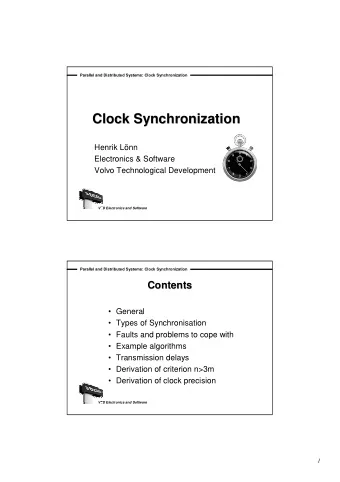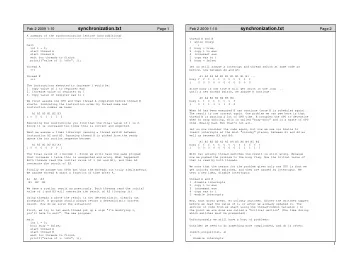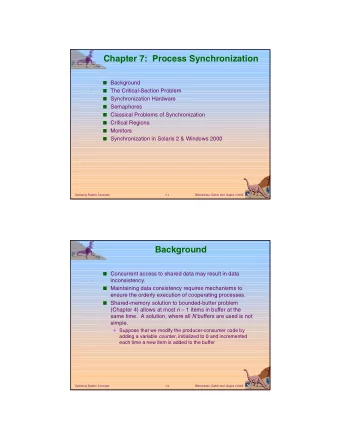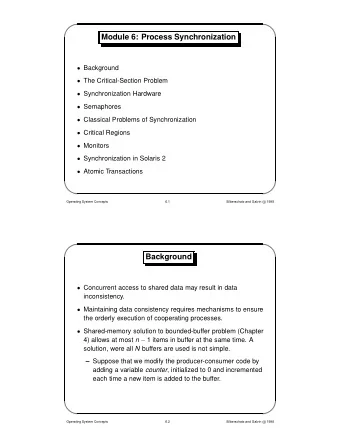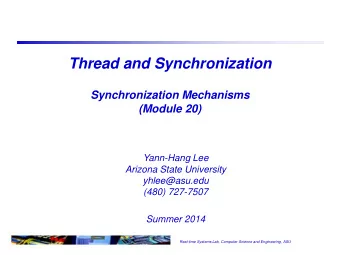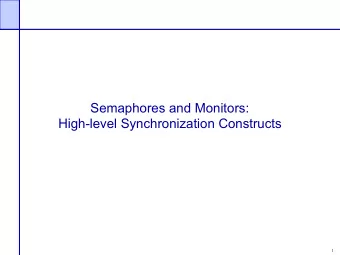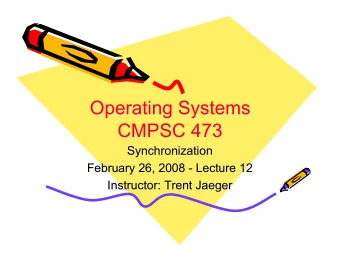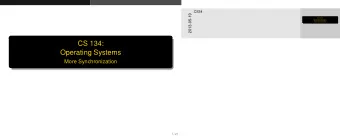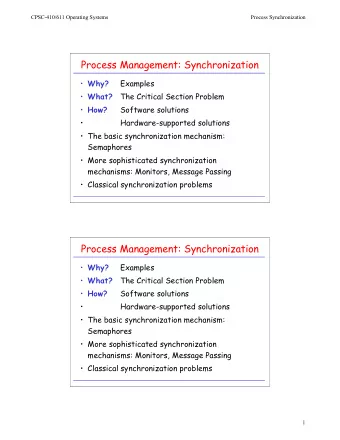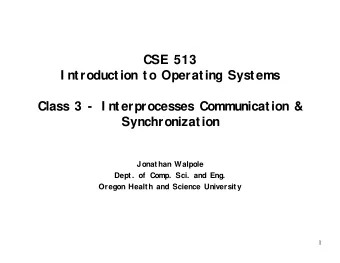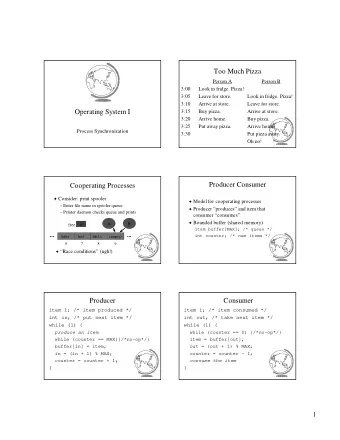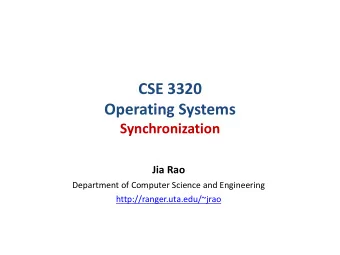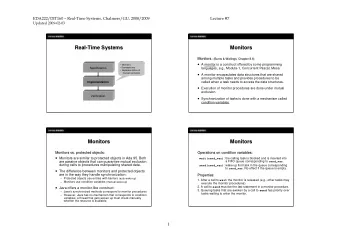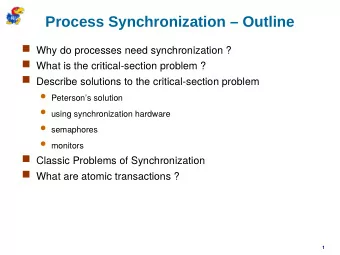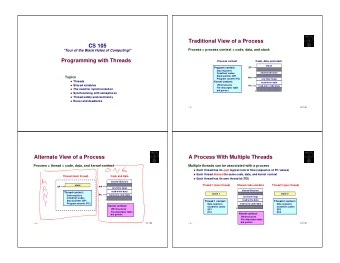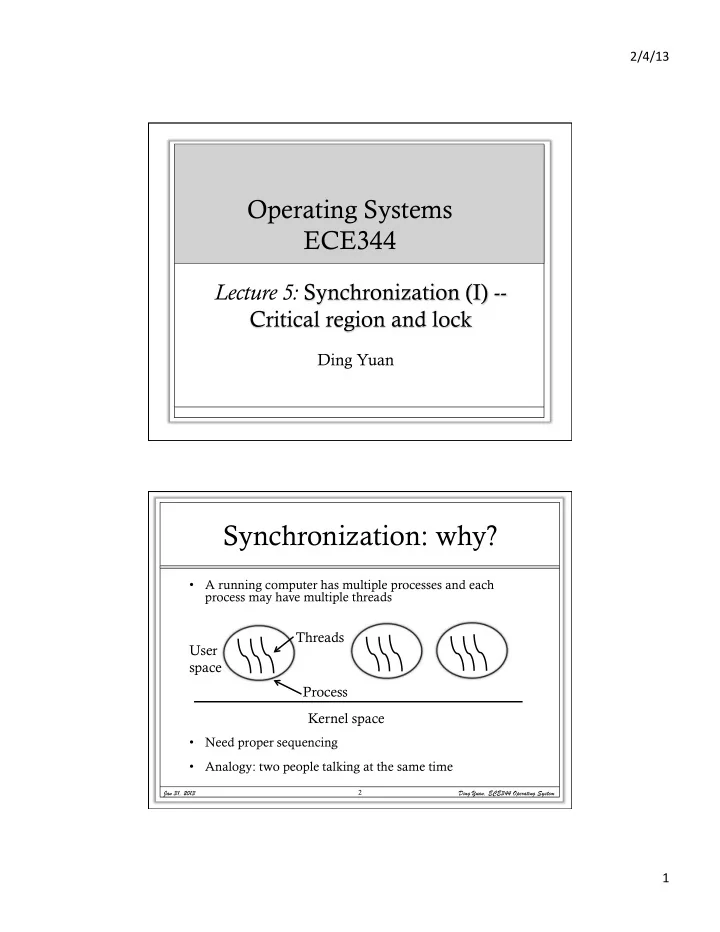
Synchronization: why? A running computer has multiple processes and - PDF document
2/4/13 Operating Systems ECE344 Ding Yuan Synchronization: why? A running computer has multiple processes and each process may have multiple threads Threads User space Process Kernel space Need proper sequencing Analogy: two
2/4/13 Operating Systems ECE344 Ding Yuan Synchronization: why? • A running computer has multiple processes and each process may have multiple threads Threads User space Process Kernel space • Need proper sequencing • Analogy: two people talking at the same time Jan 31, 2013 Ding Yuan, ECE344 Operating System 2 1
2/4/13 A simple game • Two volunteers to play two threads • Producer: produce 1 cookie bar per iteration • Step1: increment the counter on the board • Step2: put one cookie on the table • Consumer: • Step1: read the counter LOUD • Step2a: if the counter is zero, go back to step1 • Step2b: if the counter is nonzero, take a cookie from the table • Step 3: decrement counter on the board • Rule: only one should “operate” at any time • You are the OS • You decide who should operate, who should freeze • Can you get them into “trouble” before the cookies run out? 3 Jan 31, 2013 Ding Yuan, ECE344 Operating System A simple game (cont.) • Producer: produce 1 cookie per iteration • Step1: increment the counter on the board Switch to consumer, • Step2: put one cookie bar on the table what will happen? • Consumer: • Step1: read the counter LOUD • Step2a: if the counter is zero, go back to step1 • Step2b: if the counter is nonzero, take a cookie from the table • Step 3: decrement counter on the board Switch to producer, what will happen? Jan 31, 2013 4 Ding Yuan, ECE344 Operating System 2
2/4/13 Data races • Why are we having this problem? • Reason: • concurrency • data sharing • What are shared in this game? • Share the counter • Share the cookie 5 Jan 31, 2013 Ding Yuan, ECE344 Operating System Shared Resources • The problem is that two concurrent threads (or processes) accessed a shared resource without any synchronization • Known as a race condition (memorize this buzzword) • We need mechanisms to control access to these shared resources in the face of concurrency • So we can reason about how the program will operate • Shared data structure • Buffers, queues, lists, hash tables, etc. Jan 31, 2013 6 Ding Yuan, ECE344 Operating System 3
2/4/13 Can you give me some real world examples • What are shared in real world and require some synchronization? 7 Jan 31, 2013 Ding Yuan, ECE344 Operating System When are resources shared? • Local variables are not shared (private) • Stored on the stack • Each thread has its own stack • Never pass/share/store a pointer to a local variable on the stack for thread T1 to another thread T2 • Global variables and static objects are shared • Stored in the static data segment, accessible by any thread • Dynamic objects and other heap objects are shared • Allocated from heap with malloc/free or new/delete • Accesses to shared data need to be synchronized Jan 31, 2013 8 Ding Yuan, ECE344 Operating System 4
2/4/13 Why synchronize? • Interleaving by an access from another thread to the same shared data between two subsequent accesses can result in errors 9 Jan 31, 2013 Ding Yuan, ECE344 Operating System Analogy • Synchronization is like traffic signals • Each thread is like a car----it can make progress independently with its own speed • Road or intersection is the shared resource • http://www.youtube.com/watch?v=nocS1Z4gcDU Jan 31, 2013 10 Ding Yuan, ECE344 Operating System 5
2/4/13 Classic Example • Suppose we have to implement a function to handle withdrawals from a bank account: withdraw (account, amount) { balance = get_balance(account); balance = balance – amount; put_balance(account, balance); return balance; } • Now suppose that you and your significant other share a bank account with a balance of $1000. • Then you each go to separate ATM machines and simultaneously withdraw $100 from the account. Jan 31, 2013 11 Ding Yuan, ECE344 Operating System Example Continued • We’ll represent the situation by creating a separate thread for each person to do the withdrawals • These threads run on the same bank machine: withdraw (account, amount) { withdraw (account, amount) { balance = get_balance(account); balance = get_balance(account); balance = balance – amount; balance = balance – amount; put_balance(account, balance); put_balance(account, balance); return balance; return balance; } } • What’s the problem with this implementation? • Think about potential schedules of these two threads Jan 31, 2013 Ding Yuan, ECE344 Operating System 12 6
2/4/13 Interleaved Schedules • The problem is that the execution of the two threads can be interleaved: balance = get_balance(account); balance = balance – amount; Execution balance = get_balance(account); sequence Context switch seen by CPU balance = balance – amount; put_balance(account, balance); put_balance(account, balance); • What is the balance of the account now? • Is the bank happy with our implementation? • What if this is not withdraw, but deposit? Jan 31, 2013 13 Ding Yuan, ECE344 Operating System How Interleaved Can It Get? How contorted can the interleavings be? • We'll assume that the only atomic operations are reads and writes of words • Some architectures don't even give you that! • We'll assume that a context ............... get_balance(account); switch can occur at any balance = get_balance(account); time balance = ................................... • We'll assume that you can balance = balance – amount; delay a thread as long as you balance = balance – amount; like as long as it's not delayed put_balance(account, balance); forever put_balance(account, balance); Jan 31, 2013 Ding Yuan, ECE344 Operating System 14 7
2/4/13 Mutual Exclusion • We want to use mutual exclusion to synchronize access to shared resources • This allows us to have larger atomic blocks • Code that uses mutual exclusion to synchronize its execution is called a critical region (or critical section) • Only one thread at a time can execute in the critical region • All other threads are forced to wait on entry • When a thread leaves a critical region, another can enter • Example: sharing your bathroom with housemates Jan 31, 2013 15 Ding Yuan, ECE344 Operating System Critical Region (Critical Section) • What requirements would you place on a critical section? Jan 31, 2013 16 Ding Yuan, ECE344 Operating System 8
2/4/13 Critical Region Requirements (apply to both thread and process) 1) Mutual exclusion (mutex) • No other thread must execute within the critical region while a thread is in it 2) Progress • A thread in the critical region will eventually leave the critical region • If some thread T is not in the critical region, then T cannot prevent some other thread S from entering the critical region 3) Bounded waiting (no starvation) • If some thread T is waiting on the critical region, then T should only have wait for a bounded number of other threads to enter and leave the critical region 4) No assumption • No assumption may be made about the speed or number of CPUs Jan 31, 2013 17 Ding Yuan, ECE344 Operating System Critical Region Illustrated Jan 31, 2013 18 Ding Yuan, ECE344 Operating System 9
2/4/13 Mechanisms For Building Critical Sections • Atomic read/write • Can it be done? • Locks • Primitive, minimal semantics, used to build others • Semaphores • Basic, easy to get the hang of, but hard to program with • Monitors • High-level, requires language support, operations implicit • Messages • Simple model of communication and synchronization based on atomic transfer of data across a channel • Direct application to distributed systems • Messages for synchronization are straightforward (once we see how the others work) Jan 31, 2013 19 Ding Yuan, ECE344 Operating System Mutual Exclusion with Atomic Read/Writes: First Try int turn = 1; while (true) { while (true) { while (turn != 1) ; while (turn != 2) ; critical region critical region turn = 2; turn = 1; outside of critical region outside of critical region } } This is called alternation It satisfies mutex: • If blue is in the critical region, then turn == 1 and if yellow is in the critical region then turn == 2 (why?) • (turn == 1) ≡ (turn != 2) It violates progress: the thread could go into an infinite loop outside of the critical section, which will prevent the yellow one from entering. Easy to use? (what if more than 2 threads? what if we don’t know how many threads?) Jan 31, 2013 Ding Yuan, ECE344 Operating System 20 10
2/4/13 Locks • A lock is an object in memory providing two operations • acquire(): before entering the critical region • release(): after leaving a critical region • Threads pair calls to acquire() and release() • Between acquire()/release(), the thread holds the lock • acquire() does not return until any previous holder releases • What can happen if the calls are not paired? • Locks can spin (a spinlock) or block (a mutex) Jan 31, 2013 21 Ding Yuan, ECE344 Operating System Using Locks acquire(lock); balance = get_balance(account); withdraw (account, amount) { balance = balance – amount; acquire(lock); acquire(lock); balance = get_balance(account); Critical balance = balance – amount; put_balance(account, balance); Region put_balance(account, balance); release(lock); release(lock); balance = get_balance(account); return balance; balance = balance – amount; } put_balance(account, balance); release(lock); • What happens when blue tries to acquire the lock? • Why is the “return” outside the critical region? Is this OK? • What happens when a third thread calls acquire? Jan 31, 2013 Ding Yuan, ECE344 Operating System 22 11
Recommend
More recommend
Explore More Topics
Stay informed with curated content and fresh updates.
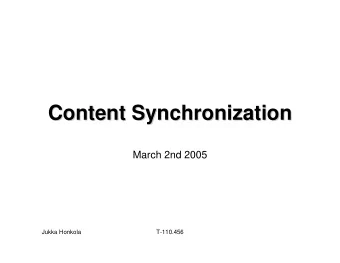
![Chapter 6: Process [& Thread] Synchronization Why is synchronization needed? CSCI [4|6]](https://c.sambuz.com/955290/chapter-6-process-thread-synchronization-s.webp)
![CSCI [4|6] 730 Operating Systems Synchronization Part 1 : The Basics Maria Hybinette, UGA](https://c.sambuz.com/926227/csci-4-6-730-operating-systems-s.webp)
